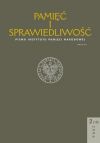Służba Bezpieczeństwa wobec inteligencji twórczej od Października ’56 do Marca ’68
The Security Service and creative intellectuals between the Polish October ’56 and March ’68
Author(s): Konrad RokickiSubject(s): History
Published by: Instytut Pamięci Narodowej
Summary/Abstract: Security service became truly interested in the environments of creative intellectuals as late as in the end of the fifties. Former persecution of writers, journalists, scientists had been connected with their activities in independence or catholic organisations or with their anti-soviet expression from the pre-war period. Moreover, these were only occasional cases. In the Stalinism period in Poland intellectuals’ environments were pacified: the indubitable fascination of communism ideology co-existed or mixed with fear of open terror. In the October 1956 the intellectuals collectively supported Władysław Gomułka, hoping for the system liberalisation. The disappointment came the very following year – dissolution of pro-reformatory magazine „Po prostu”, ban against printing the literary magazine „Europa” signalled leaving the October achievements. Soon the censorship was again blocking publications, discussion clubs were being closed down, the lawsuits of people who „slander the system and the authorities” started. Such actions of the authorities led to creation of non-institutional opposition existing within Polish Literary Society. After the Bent Circle Club (Klub Krzywego Koła) was closed, the Society was the last forum of criticism and discussion. It was the writers’ milieu, being less dependent of administrative means than scientists or journalists, who organised the best known protest against the cultural policy of the party (the Letter of 34), it were the writers to hand in their membership cards after closing of „Europa” or later when in 1966 Kołakowski was expelled from PZPR, finally it was the Literary Society to support the demonstrating students in March 1968. The Security Service used a wide range of operational methods against the intellectuals. In 1956-1968 this group was being invigilated by the Fourth Department of the Third Division of the Ministry of Interior, although due to the numerous contacts with foreign countries, much material can be found in inheritance of the Third Department of the above division. The basic source of information was agents’ network, however, there were few secret co-operators, more information was gained with the help of so called confidential contacts, usually party members, who were obliged to help the Security Service because of the post they were holding. The most politically active people, such as Jasienica, Lipski or Kołakowski, had bugs planted, were being observed and their letters were being checked. In the current article two cases were presented as exemplification: one of J.N. Miller, who was proved to co-operate with the London „News”, and N. Karsov and S. Szechter, who were prevented to publish abroad materials from political lawsuits.
Journal: Pamięć i Sprawiedliwość.
- Issue Year: 10/2006
- Issue No: 2
- Page Range: 167-182
- Page Count: 16
- Language: Polish

